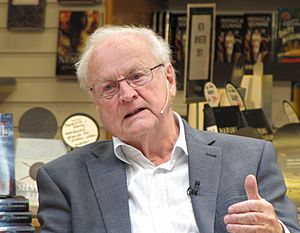Arvid Carlsson facts for kids
Quick facts for kids
Arvid Carlsson
|
|
|---|---|

Carlsson in 2011
|
|
| Born | 25 January 1923 Uppsala, Sweden
|
| Died | 29 June 2018 (aged 95) Göteborg, Sweden
|
| Alma mater | Lund University |
| Known for | Dopamine |
| Awards | Wolf Prize in Medicine (1979) Japan Prize (1994) Feltrinelli International Award (1999) Nobel Prize in Physiology or Medicine (2000) |
| Scientific career | |
| Institutions | University of Gothenburg |
Arvid Carlsson was a Swedish scientist who studied how the brain works. He is famous for his important discoveries about a brain chemical called dopamine. His work helped us understand how dopamine affects movement and diseases like Parkinson's disease.
In 2000, Arvid Carlsson won the Nobel Prize in Physiology or Medicine for his research on dopamine. He shared this big award with two other scientists, Eric Kandel and Paul Greengard.
Contents
Early Life and Learning
Arvid Carlsson was born on January 25, 1923, in Uppsala, Sweden. He was one of four children in his family. His family later moved to Lund because his father became a history professor there.
While his older siblings chose to study history like their father, Arvid decided to study medicine. He started his medical studies at Lund University in 1941.
Helping People During Wartime
In 1944, during World War II, Arvid helped examine people who had been held in Nazi concentration camps. These prisoners were brought to neutral Sweden by a Swedish leader named Folke Bernadotte. Arvid helped care for these people. He earned his medical degree and a PhD in pharmacology in 1951.
A Career in Brain Science
In 1951, Carlsson became a professor at Lund University. He then spent five months in the United States, learning from another scientist. This trip changed his focus to studying how medicines affect the mind. This new path eventually led to his Nobel Prize. In 1959, he became a professor at the University of Gothenburg.
Discovering Dopamine's Role
In 1957, another scientist showed that dopamine was present in the human brain. Later that same year, Arvid Carlsson also proved that dopamine was a special messenger chemical, called a neurotransmitter, in the brain. Before this, many thought it was just a building block for another chemical.
Carlsson then created a way to measure how much dopamine was in different parts of the brain. He found that the basal ganglia, a brain area important for controlling movement, had very high levels of dopamine.
Connecting Dopamine to Parkinson's Disease
Arvid Carlsson did experiments with animals. He showed that if animals were given a drug called reserpine, their dopamine levels dropped. This caused them to lose control of their movements. These effects looked a lot like the symptoms of Parkinson's disease.
Then, he gave these animals a substance called L-Dopa. L-Dopa is a chemical that the brain can turn into dopamine. When the animals received L-Dopa, their movement problems got better.
These amazing findings led doctors to try L-Dopa for people with Parkinson's disease. It was found to help reduce some of the symptoms, especially in the early stages. Even today, L-Dopa is the main medicine used to treat Parkinson's disease.
Developing New Medicines
During the 1970s and 1980s, Carlsson worked with a drug company called Astra AB (now AstraZeneca). He and his team helped create the first medicine of a new type called a selective serotonin reuptake inhibitor (SSRI). This medicine was called zimelidine.
Zimelidine was later taken off the market because of rare side effects. However, Carlsson's research opened the door for other important SSRI medicines, like fluoxetine (known as Prozac). These medicines are now widely used to help people with depression and anxiety.
Even when he was over 90 years old, Arvid Carlsson was still an active researcher. He worked with his daughter Lena on a medicine called OSU6162. This medicine helps balance dopamine and can help with tiredness after a stroke.
Awards and Special Recognition
Arvid Carlsson's groundbreaking research on brain chemicals and his work on Parkinson's disease treatment earned him the 2000 Nobel Prize in Physiology or Medicine. He shared this honor with Paul Greengard and Eric R. Kandel.
He also received many other important awards, including:
- The Wolf Prize in Medicine from Israel (1979)
- The Japan Prize (1994)
- The Feltrinelli Prize from Italy (1999)
In 1975, he became a member of the Royal Swedish Academy of Sciences. This is a group of very respected scientists in Sweden.
Personal Life
Arvid Carlsson married Ulla-Lisa Christoffersson in 1945. They had three sons and two daughters. His daughter Maria worked as his lab manager, and his daughter Lena was also a scientific partner.
Arvid Carlsson passed away on June 29, 2018, at the age of 95. His work changed how we understand the brain and how we treat brain diseases.
See also
 In Spanish: Arvid Carlsson para niños
In Spanish: Arvid Carlsson para niños
 | Delilah Pierce |
 | Gordon Parks |
 | Augusta Savage |
 | Charles Ethan Porter |

